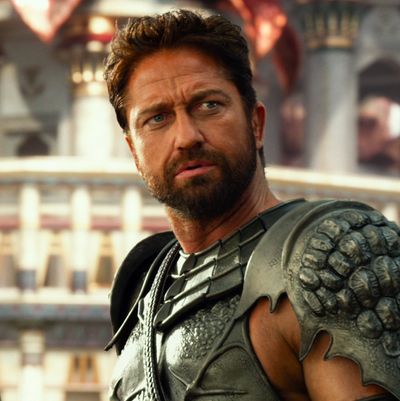
“I’m the goddess of too much,” says the beautiful Hathor (Elodie Yung) partway through Gods of Egypt. Who’s the god or goddess of too little? Because one could imagine that Alex Proyas’s film might be the end result of an epic battle between those two deities. It’s both thin and overstuffed, filled with intricate, at times dazzling setpieces peopled by characters we don’t care about, and an irreverent sense of fun that nevertheless leaves us cold. It tries so hard … and ultimately achieves so little.
The story has an old-fashioned feel, and one could easily imagine it being made in the 1950s with someone like Victor Mature or Jeff Chandler. On the day that the god Horus (Nikolaj Coster-Waldau) is due to be crowned king of Egypt by his father Osiris (Bryan Brown), the latter’s bitter, exiled brother Set (Gerard Butler) crashes the coronation, kills Osiris, seizes the crown, and pulls out Horus’s eyeballs. Then, he announces to the soon-to-be-enslaved masses of Egypt that the rules for getting into the Afterlife are changing. “My brother thought the Afterlife was a gift!” he sneers. “From now on, you’ll have to buy your way in with riches earned!” Then he adds, “It will be the yugest, most luxurious Afterlife you’ve ever seen! It’ll make your head spin!” I might have made up that last part.
The hero proper of the story, however, is Bek (bland, bland Brenton Thwaites), a lowly mortal and thief who infiltrates Set’s treasure vault and makes off with, among other things, Horus’s magic eyeballs. And when his beloved Zaya (Courtney Eaton) is killed, his journey gathers some urgency: He wants the disgraced god, along with the aforementioned Hathor, to help save Zaya from vanishing into metaphysical nothingnesss. (She doesn’t have the necessary wealth to get into the Afterlife. “I have only my smile,” she adorably says to Anubis, the jackal-headed god of that realm.)
Yes, the story is corny and old-fashioned, and the casting distressingly lily-white, but visually, the movie is in some ways of the moment. Director Proyas, who once had a cult following thanks to The Crow and Dark City, can do wonders with elaborately imagined environments, and Gods of Egypt has plenty of those: Set’s pyramid of sand, a constantly shifting, treacherous place with walls and stairs that keep blowing in and out of existence, is a particular highlight, as is a library populated by multiple manifestations of Thoth (Chadwick Boseman), the god of science and knowledge.
Does it matter that it’s all so computer-generated that we might as well be watching an animated film? I’m not sure. Both visually and narratively, Gods of Egypt seems to be inspired more by video games than by Egyptian mythology. You don’t really wonder what will happen next in this movie, but you do wonder what setpiece, or challenge, it will throw at you next. Well, video games and, of course, the superheroes that so dominate the current cinematic landscape; if Samuel L. Jackson’s Nick Fury showed up at the end to recruit Horus into the Avengers, I doubt many would even blink.
Meanwhile, Proyas and screenwriters Matt Sazama and Burk Sharpless (who co-wrote Dracula Untold, a pseudo-mythical update that managed to be fairly entertaining) struggle to take these characters away from the stolid portent of yore and give them a modern-day playfulness. So we get some vaguely sexy banter between Hathor and Horus, and even some cheeky bits of humor from Set. (“Can you make it taller?” he asks his chief architect, upon being shown the comically huge obelisk erected in his honor… before adding, “Relax, I’m joking.”) But it all falls flat: The dialogue is never irreverent or funny or particular enough to give these characters shape or dimension. It all feels like background banter.
Gods of Egypt isn’t without its entertaining moments, and, to be fair, it gets better as it goes along. But there’s a fundamental disconnect between its attempts to mix likable, life-size characters (figuratively speaking at least – the gods are actually about twice the size of the mortals, which is actually a nice touch) with an ornate, visually overwhelming universe that’s part-myth, part-Marvel, and part-Playstation. It’s not so much that it can’t be done, but the chasm between ambition and execution in this case is vast: The characters feel anonymous, and as a result this world has no weight, or consequence. If it weren’t all CGI, I would have said I hope they saved the sets for another, better movie.


